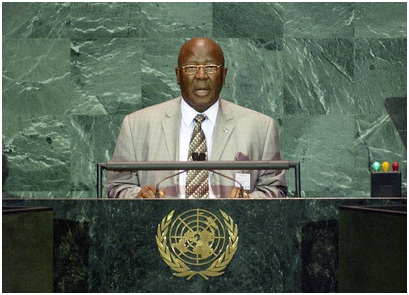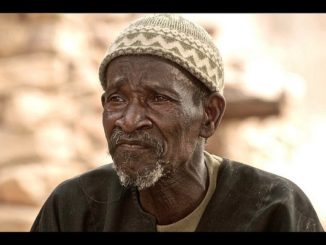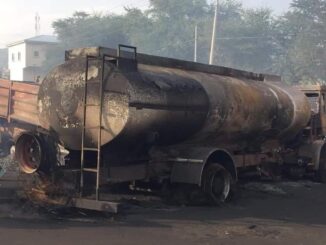
ADDRESS BY THE PRESIDENT OF THE
REPUBLIC OF SIERRA LEONE
HIS EXCELLENCY
ALHAJI DR AHMAD TEJAN KABBAH
TO THE HIGH-LEVEL MEETING OF THE 60TH SESSION OF
THE UNITED NATIONS GENERAL ASSEMBLY
NEW YORK, FRIDAY 16 SEPTEMBER 2005
Esteemed Co-Presidents of the High-Level Meeting of the General Assembly
Esteemed Colleagues
Mr Secretary-General
Excellencies, Ladies and Gentlemen:
The United Nations is alive. Our presence here today is a testimony to this fact. After sixty years of existence in a turbulent and rapidly changing world, its efficacy remains unquestionable. Of course it was founded on certain principles and ideals. Of course its purposes are couched in patently high expectations. However, like the States that comprise its membership, the United Nations was never intended to be nor will it ever become a perfect organization.
While we are preoccupied with institutional reforms, and while we acknowledge its weaknesses, we should not allow the controversies of recent years to drown the positive impact the Organization has made in the lives of millions of people throughout the world. Let us think about the tremendous work of UNDP, UNICEF, WHO, ILO, UNHCR, OCHA, FAO and other organizations and agencies of the United Nations system. This sixtieth anniversary of the United Nations is therefore a time to celebrate all that the United Nations has achieved and is trying to achieve.
One such achievement is in the area of peacekeeping. In three months’ time the people of my country will be saying goodbye to UNAMSIL, the United Nations peacekeeping mission in Sierra Leone. UNAMSIL is obviously a success story. We must tell it. We must applaud it. UNAMSIL has made a significant contribution to peace and security in Sierra Leone, and to some extent to stability in the West African sub-region as a whole.
I am pleased to inform this august Assembly that the mission of UNAMSIL should be considered accomplished. With the assistance and cooperation of UNAMSIL and the British led International Military Advisory and Training Team (IMATT), the Republic of Sierra Leone Armed Forces have now assumed their full constitutional responsibility for the security of the State.
On behalf of the people and Government of Sierra Leone I should like to take this opportunity of expressing our appreciation to all the countries that contributed troops, civilian police and civilian personnel to the regional and international peacekeeping activities in my country over the past ten years. Let me also pay special tribute to the gallant men and women who lost their lives in the service of UNAMSIL’s effort.
Fellow Presidents,
Five years ago, from this rostrum at the Millennium Summit, I like other leaders spoke about the imperative of adaptation. We also urged the United Nations to continue to adapt and equip itself to deal with the perennial problems and new manifestation of human insecurity and underdevelopment. I also spoke about some of the ways in which Sierra Leone had tested the capacity of the United Nations to adapt itself to respond to global challenges.
Today, the Organization is preparing to transform its peacekeeping functions to meet some of the peace building needs of the country. We welcome the recent decision of the Security Council to establish an integrated Office following the withdrawal of UNAMSIL. The office will play a pivotal role in our peace building and could help in providing guidelines for the establishment of the Peace Building Commission.
Fellow Presidents,
It is not enough to establish these short-term but essential post-conflict bridges. What we need desperately is the mobilization of resources including those required for capacity building, for sustainable economic and social development. The objective is not merely one of ensuring that Sierra Leone and other countries emerging from conflict do not slide back into conflict. Rather, the ultimate objective must be to ensure that Sierra Leoneans do not remain in abject poverty.
The three main elements – development, peace and security, and human rights – highlighted in the Secretary-General’s report entitled “In Larger Freedom” and in the Outcome Document of this High-Level Meeting, are all interrelated. However, as the document states, development is a central goal by itself. It is therefore self-evident that Sierra Leone should attach great importance to the development cluster of the Outcome Document, including the section on ways of meeting the special needs of Africa.
The reasons are obvious. Sierra Leone is still one of the least developed countries of the world. It is a country where rebels used the legitimate socio-economic concerns of the people as a pretext for launching a brutal armed conflict for their own personal ends. Ironically in collusion with foreigners the rebels plundered the nation’s mineral resources in exchange for arms to eliminate the very people whose cause they claimed to have been defending.
Fellow Presidents,
Economic and social development may not solve all the problems facing countries such as Sierra Leone. However, from our experience, the answer to most of the armed conflicts in the developing world lies in sustainable economic and social development. The United Nations and the international community could, through partnership help us avert or alleviate most of the problems that lead to armed conflict.
The people of Sierra Leone continue to attach importance to the Millennium Development Goals (MDGs) and the commitments we the Heads of State and Government made in this Assembly five years ago. The principal purpose of this High-Level Meeting is to renew our determination to fulfil those commitments.
This Assembly would be interested to know that the food security objective of ensuring that no Sierra Leonean goes to bed hungry by the year 2007 is consistent with and directly linked to the MDGs. So are the objectives embodied in our Poverty Reduction Strategy Paper (PRSP). We are determined to continue to work with our development partners to achieve those objectives.
For the overwhelming majority of us, ‘freedom from want’ means the collective responsibility to eradicate extreme poverty, the collective responsibility to ensure the human right to food, basic health care, education, clean water and other amenities that sustain life. As we see it, ‘freedom from fear’ means the collective responsibility of all States to remove and eliminate the instruments that threaten the safety and security of people everywhere, such as the illicit traffic and use of small arms, and the accumulation of nuclear and other weapons of mass destruction. Yes, to remove the threat of international terrorism.
Fellow Presidents,
The United Nations and the international community have made important strides in addressing impunity. The establishment of the International Criminal Court, the Special Court for Sierra Leone and the Truth and Reconciliation Commission (TRC) testify to this. Reconciliation would however be incomplete unless we address the special needs of the victims of the heinous crimes that were perpetrated on civilians during the armed conflict.
I would therefore make a solemn appeal to the international community to assist us in addressing the issue of reparation for the victims of war crimes and crimes against humanity. Within its limited resources, my Government has made every effort to address the special needs of the victims of the eleven-year rebel armed conflict. We need international support for these victims, through for instance the Fund for War Victims envisaged under the 1999 Lome Peace Agreement, and the National Commission for War Affected Children.
Fellow Presidents,
On this occasion we are reminded that the United Nations is and should remain the centre for mobilizing and harmonizing the actions of nations in the attainment of its common objectives. The Organization belongs to us all and operates in the larger interest of all its members. Let this sixtieth anniversary be a time for recommitment to the principles and purposes of the Charter; a time for renewed determination to build on the success of this great Organization.
It is also a time to note that the geopolitics of today demand that Africa’s role in the UN organs including the Bretton Woods Institutions should be reconsidered. This question is presently engaging the full attention of African leaders.
The United Nations is alive. It continues to serve its purpose. We must keep it alive.
I thank you.



